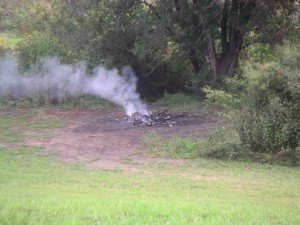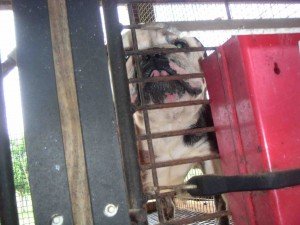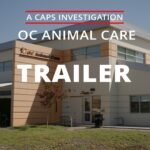

Pet shop: American Breeders, New York Breeder: Steve Kruse
One sunny afternoon in August, 2012, Noelle wandered into a pet store with her friend. Although she had no intention of purchasing a puppy, she fell in love. She walked out of that store with adorable Luigi, an English Bulldog. And then her nightmare began.
Luigi’s Story
Luigi came with papers certifying that he was a neutered male, that he’d had a navel hernia surgery (hence the large scar on his belly), that he was born on June 22nd, and little else. None of that would matter, though, in the days and weeks to come. You see, Luigi was sick – very sick. Vomiting, diarrhea, difficulty breathing, coughing … he was one very sick puppy as little as a day after Noelle brought him home.
When she was initially purchasing Luigi, she questioned his missing patches of fur. The store owner told her that puppies lose their fur to grow “adult fur.” She would come to learn that it was because of dermatitis. This pet store owner likes to place blame on the people who’ve purchased puppies from him. He talks about how they must not be caring properly for them. And when Noelle told him about Luigi’s respiratory illness, he blamed the vet, saying he must have given him the wrong antibiotic.
In the meantime, Luigi became very ill, suffering from multiple maladies.

Noelle took the puppy to her own veterinarian, who clarified that Luigi was, in fact, not neutered. Her vet questioned whether the scar on his belly had been from a “navel hernia surgery” or if it had actually been a hernia caused from poor genetics. The vet treated Luigi for Giardia – a parasitic infection and the cause of his diarrhea – and the dermatitis. He also determined that Luigi had a small trachea with stenotic nasal passages; due to illness or poor breeding, the puppy had a hypo-trachea, one that was so small it was “like breathing through a coffee stir.”
Luigi’s new vet was most concerned about his coughing – he would later determine that it was probably from canine flu, since Noelle’s other dog eventually contracted the flu (with no known exposure to any other dog.) The coughing was only a symptom of an illness that would take strong hold of the little puppy’s weak immune system, with bronchitis eventually becoming pneumonia.
Luigi struggled to breathe, and Noelle struggled to pay the enormous vet bills that added up quickly.
Eventually Luigi recovered. No more parasites, no more bronchitis, no more pneumonia. And he was neutered. But his health never reached full wellness, and he always seemed weak and vulnerable. At least Noelle could rest a bit easier, knowing he was no longer terribly sick. And she could begin to recover from all the vet bills and expenses incurred.
She went back to the pet shop and complained to the owner, who refunded her purchase price only after she filed a complaint with the Better Business Bureau. She complained to the Iowa Board of Veterinary Medicine, since it seemed there was something fishy about a vet allegedly performing a hernia operation on a young puppy (not to mention the neuter that did not take place.) The board responded that they found nothing out of the ordinary.
Luigi has continued to have health issues over the years. He has suffered repeated urinary tract infections, developed a corkscrew tail that grew inward/inverted to the extent that it caused a pocket infection and had to be amputated, and has had bladder issues that required ultrasounds to rule out kidney stones and bladder infection.

Recently Luigi has begun to experience some new symptoms, which may or may not be related. He has urinary incontinence, peeing as he walks, sometimes just peeing whenever. And he has begun to have seizures. Last fall, Luigi suffered cluster seizures that were so severe, he seemed to have difficulty breathing. You can imagine just how much this worried Noelle. But to determine a possible cause of either condition would require $2500 for an MRI, which Noelle just cannot afford right now – especially because there’s no guarantee the MRI would in fact tell them anything.
And so she keeps a close eye on Luigi, day in and day out. She worries he’ll have another severe cluster, and that he won’t be able to breathe. She wonders why he has the urinary problem, and feels badly that she can’t do anything more than she’s already done to help him. Luigi is 3 ½ years old, and has already cost thousands and thousands of dollars. And his health is still not good.
What Noelle didn’t know when she walked into the pet store that warm summer day is that this happens to so many others each and every day. Too often, the public is still in the dark about the source of those cute puppies you see in pet stores throughout the country.
The Damage Done by a Puppy Mill
A dog-lover walks into one of these shops, falls in love with a bundle of fur and walks out hundreds-to-thousands of dollars lighter but carrying an adorable puppy to call their own. And then the nightmare begins.
Noelle Todd is one such purchaser, having found her adorable puppy at the American Breeders pet store in Wappingers Falls, NY, now closed. What she didn’t know then was that her beautiful new friend could be traced back to a large-scale breeder in Iowa by the name of Steve Kruse. Nor did she know that the store she bought her puppy from was itself a cruel place for dogs. The owner and store manager for the American Breeders in Danbury, CT would both be charged with animal cruelty.
The Companion Animal Protection Society (CAPS) investigated the American Breeders stores in Wappingers Falls and Mohegan Lake, NY, reporting the latter to the New York Department of Agriculture and Markets for cage trays filled to the top with urine (trays in empty cages were stained yellow from improper cleaning), dirty water and shredded newspaper in water bowls.
Kruse Kennels – A Special Kind of “Breeder”

Steve Kruse is a large-scale USDA-licensed dog broker and breeder in West Point, IA with a long history of selling sick puppies. CAPS has received many complaints over the years for sick, deformed and dying puppies he bred and sold to pet shops. On January 12th, 2016, the USDA finally cracked down and suspended Kruse’s license for 21 days, effective January 12. (CAPS investigation)
For the past fifteen years, Kruse has kept more than 900 to roughly 1,800 dogs and puppies in his facilities (he currently has three locations; USDA does not list addresses for the two satellite locations on Kruse’s inspection reports). CAPS has been investigating Steve Kruse and his family members for many years.
In 2004, CAPS sent an undercover investigator to examine the inner workings of Kruse’s business, and to videotape his findings. Some of what the investigator witnessed is shown in the video below:

Perhaps most disturbing was the smoldering burn pile – which appeared to contain bones, according to the CAPS investigator.
CAPS recently filed a complaint with the USDA regarding Steve Kruse. For years he has passed federal inspections – performed by the same inspector. Despite what seem to be obvious, glaring infractions of Animal Welfare Act (AWA) regulations, USDA inspector John Lies rarely cited Kruse. We wonder if it was because Kruse threatened Lies during an inspection at a dog auction in 2006.
Kruse Connections

At that auction, Kerry Blue Terrier Foundation obtained a number of Kruse dogs in bad condition, including one dog that had such a deep hole it its cheek that teeth were exposed.
It’s difficult to believe Kruse would have been able to pass inspections when the CAPS undercover investigation revealed violations of AWA regulations.
Steve Kruse was the broker for his aunt and uncle, Leroy and Gertrude Kruse, who were also investigated by CAPS. After USDA issued a warning against them in 2012, they chose to retire.
CAPS also investigated the USDA-licensed Salem, IA facility owned by Kruse’s nephew, Jordan Kruse, who died at age 22, a few months before our investigation. At that time, the father, Victor, was running the facility. Jordan’s brother, Jake, now holds the USDA license for the facility, which he calls Kruse Farm Enterprises.
Steve Kruse also brokered for Annette Moeller, who has a USDA-licensed facility in West Point, IA. We believe the Moeller family is related to the Kruses. CAPS has been unable to gain access to Moeller’s puppy mill.

CAPS investigations of other Moeller USDA-licensed mills, Larry Moeller, Salem, IA (license cancelled in April 2014) and Melvin and Dean Moeller, West Point, IA, revealed serious violations of Animal Welfare Act regulations.
Another Kruse, Michelle, runs a USDA-licensed facility in Donnellson, IA. She recently appeared before the Sarasota County Commission to testify against the now-passed ordinance banning the retail sale of dogs and cats.
Steve Kruse was married to Judy Norford, owner of Puppy Palace pet shop in Hollywood, FL. Her store has sold sick dogs to unsuspecting customers for 25 years, causing great anguish to owner and dog alike. CAPS investigated breeders selling to Puppy Palace for a consumer lawsuit that resulted in a settlement. The Puppy Palace Boynton Beach location later closed.
Norford lives in Florida and has a driver pick up puppies in the Midwest. Her half-brothers, Tyler and Mitch Thomson, own Just Puppies pet shops in Florida and Maryland. Norford and the Thomsons had USDA “B” licenses at one time. Tyler currently has a state kennel license in Missouri.

Steve Kruse’s main brokers are, JH & TC Holdings, LLC (Platinum Puppies), in West Point, IA, and The Hunte Corporation in Goodman, MO. USDA cited JH & TC Holdings for failing to provide the minimum of standards of care for transports. Overcrowded enclosures in vans filled to the brim with stacked cages, not allowing enough room for the dogs to move or even sit upright, are examples of the carelessness these puppies endured en route to pet stores.
An Ineffective Inspector
In the fall of 2014, USDA, heeding CAPS’ complaints about John Lies, assigned Corbin Ranslem as the animal care inspector of Steve Kruse’s three facilities (the total of dogs and puppies at all three sites is around 1800). Ranslem’s July 29, 2015 inspection of Kruse’s main facility in West Point, IA listed 823 adult dogs and 584 puppies and cited five violations. His inspection report listed 13 sick dogs: bloody, infected sores, hair loss, surgical abdominal sore without veterinary consultation, open wounds, infected eyes, extremely matted fur. The inspector should have cited each dog as a separate direct violation, yet he cited all of the veterinary care violations as just one indirect non-compliant item.
Ranslem also gave Kruse until August 11 to correct the violation (provide vet care for the 13 dogs). Other violations, all indirect, were for insufficient floor space, lack of exercise plan, and feeding. Under feeding, Ranslem stated that fecal material was mixed in with the feed, fecal material and feed was caked along the inside and outer edges of bowls, and chewed bowl surfaces were rough and jagged. Again, Ranslem should have cited these as separate, direct violations. Jagged and sharp food and water bowl edges fall are Surfaces, not Feeding, violations.
Inspections by Ranslem in August and December 2015 revealed more violations and failure to correct violations, which is why USDA issued a 21-day suspension and may take additional enforcement actions.
Follow the Money…
Over the years, many of the complaints CAPS has received, regarding sickly dogs purchased at pet stores, were traced back to Steve Kruse. One such pet store chain is Happiness Is Pets in Illinois. CAPS has been assisting with a consumer lawsuit against Happiness is Pets for selling for numerous sick and dying puppies, including those with distemper virus.

CAPS has been investigating Happiness Is Pets for over eight years and has successfully educated the public about the pet store/puppy mill connection. As a result, Happiness Is Pets now sells about half as many puppies as the chain did a few years ago. (In 2006 they sold over 5,000 puppies; in 2011, it was down to around 3,750.)
Additionally, Happiness is Pets no longer sources puppies from Kruse.
Steve Kruse and his ilk have shown repeatedly over the years that they think nothing of flaunting the very laws meant to protect the animals from which the Kruse clan makes a living. He has used his money, connections, and family to continue business as usual. Kruse even has a registered Iowa lobbyist in Des Moines.

This kind of cruelty and inhumane approach to domestic pets should not be tolerated, let alone condoned with clean inspection reports that mask the truth. We hope it is a sign of progress that the USDA has suspended his license – but that alone is not enough. A slap on the wrist, a few fines, will not stop someone like Steve Kruse.
CAPS looks forward to the day when the license for the Steve Kruse kennels has been terminated, and he is no longer sanctioned to breed and sell sick, genetically inferior puppies or to mistreat innocent, vulnerable creatures.
CAPS will continue to investigate, litigate, and educate until no more parent dogs wither in miserable conditions in mills, heartache and anguish is no longer forced upon consumers like Noelle who have been duped into purchasing sickly puppies, and we refuse to tolerate the improper breeding and sale of dogs like Luigi.




